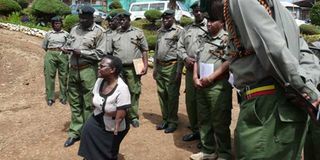Women with disabilities, too, have role in building progressive society

Josephta Oyiela Mukobe, principal secretary in the Interior Ministry, with prison officers when she visited Meru GK Prison on November 20, 2014. She was the first woman with disability to be appointed principal secretary in Kenya, in 2013. PHOTO | FILE | NATION MEDIA GROUP
What you need to know:
It is the hope of every woman with disability that the State works towards fulfilling its mandate in promoting the full realisation of all human rights and fundamental freedoms for all of them.
It is a good time that women with disabilities in Kenya, in all their diversity, join hands with all other women to build a society that is inclusive and progressive for us all.
Josephta Mukobe was the first woman with disability to be appointed principal secretary in Kenya, in 2013. This was a major milestone; over the years, women with disabilities have remained invisible. As Ms Mukobe once said, a woman with disability is always at the periphery; always the last person to count.
PROTECTION
Such women face multiple layers of discrimination. This is acknowledged in international human rights instruments such as the Convention on the Elimination of all Forms of Discrimination Against Women (Cedaw) and the Convention on the Rights of Persons with Disabilities.
Having ratified both treaties, Kenya must promote the realisation of all human rights due to women and girls with disabilities.
When the Heads of State and Government of the African Union member states adopted the African Disability Protocol, they were concerned about the multiple forms of discrimination, high levels of poverty and great risk of violence, exploitation, neglect and abuse that these women and girls face.
And in its concluding observations on the eighth periodic report of Kenya, the Cedaw Committee expressed its concern about the lack of protection of the health, sexual and reproductive rights and access to justice for the women, restraints on their legal capacity and ability to own property, and violence against them, including forced sterilisation.
SELF-ADVOCACY
Among the committee’s recommendations to Kenya is that the State protect the rights of such women and girls, ensuring that they have equal access to housing, justice, healthcare and other basic services as well as social protection. It should also promote their autonomy, access to community services and participation in political and public life.
Today, as we mark this year’s International Women’s Day, whose theme is “Balance for Better”, how do we ensure that women and girls with disabilities are part of the equation?
There is no better time than now to make sure that no one is left behind. The reality is that, often, the women and girls fall through the cracks of the women’s rights movements and the disability rights movement, leaving out their critical voices in many discussions on human rights and development.
Fortunately, many of the women are speaking out and demanding their inclusion. Civil society organisations primarily led by women with disabilities are calling out society on this ‘invisibilisation’ and demanding that it must end.
Indeed, self-advocacy remains a critical choice for all women with disabilities in ensuring that their voices are heard in a society whose tendency may be to overlook them.
HUMAN RIGHTS
A report by the Kenyan Network Advocating for the Rights of Women and Girls with Disabilities, which brings together organisations and experts working in Kenya on the rights of such women and girls, notes that, in leaving out their voice in national, regional and international discussions, and also in laws and policies, there is a danger for the State to fail to understand, and address, the human rights violations and challenges that they face.
Therefore, it is the hope of every woman with disability that the State works towards fulfilling its mandate in promoting the full realisation of all human rights and fundamental freedoms for all of them.
It is a good time that women with disabilities in Kenya, in all their diversity, join hands with all other women to build a society that is inclusive and progressive for us all.
Ms Ombati, a disability rights advocate, is an International Disability Alliance fellow. [email protected]





